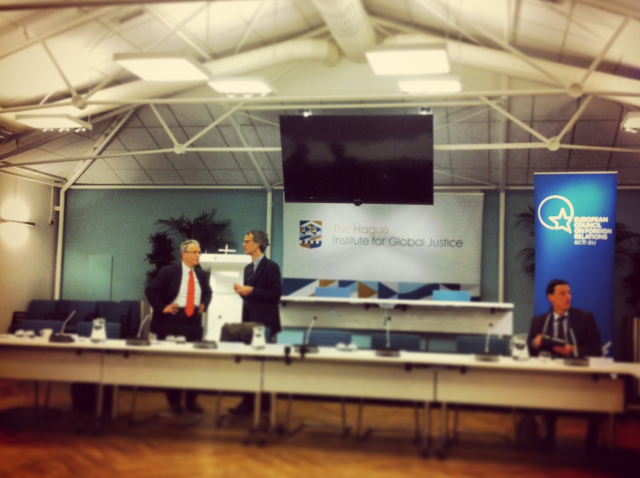
ECFR Conference on international justice and the prevention of mass atrocities in The Hague (Photo: Mark Kersten)
The debate over the relationship between peace and justice isn’t going to go away any time soon. Yet, despite all of the attention the ‘peace versus justice’ debate has received over the years, scholarship on the subject still suffers from a predilection to re-hash the same theories and arguments. It has thus been very refreshing to participate in a project, organized by Anthony Dworkin and the European Council on Foreign Relations, examining the effects of international justice mechanisms on conflict resolution.
Here’s the ECFR’s project description:
What place should the international community give to justice and accountability in its response to conflicts involving mass atrocities? Under what circumstances does the effort to pursue justice help or alternatively complicate the effort to bring atrocities to an end? Is it better to set a benchmark for justice by referring active conflicts to the International Criminal Court, or should efforts to seek justice be deferred until a peace deal is being discussed? To help inform future policymaking in this complex field, ECFR has launched a project to examine the record of past cases where international efforts to end conflict have taken different approaches to justice – ranging from the introduction of international tribunals to the acceptance of amnesties for the sake of peace.
Over the summer, the project brought together a diverse group of leading scholars on the peace-justice nexus, including Priscilla Hayner, Leslie Vinjamuri, Sarah Nouwen, Laura Davis and, course, Anthony himself. Each of the participants was asked to write a case study, the final result being twelve case-specific analyses of the effects of international justice on conflict resolution in: Afghanistan, Bosnia & Herzigovina, the DRC, Israel & Palestine, Kosovo, Liberia, Libya, Sierra Leone, Sudan, Syria, Uganda and Yemen.
All of the cases are accessibly written and are relatively short (about 2,500 words). I encourage all readers and anyone interested to check out this fantastic resource here and to pass it along to students and colleagues!

